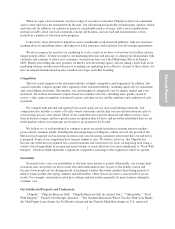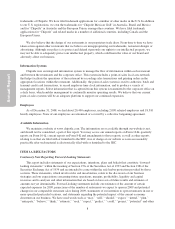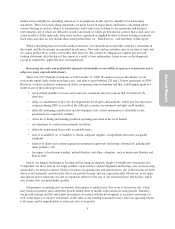Chipotle 2008 Annual Report Download - page 18
Download and view the complete annual report
Please find page 18 of the 2008 Chipotle annual report below. You can navigate through the pages in the report by either clicking on the pages listed below, or by using the keyword search tool below to find specific information within the annual report.
agencies. We may experience material difficulties or failures in obtaining the necessary licenses or approvals for
new restaurants, which could delay planned restaurant openings. In addition, stringent and varied requirements of
local regulators with respect to zoning, land use and environmental factors could delay or prevent development
of new restaurants in particular locations.
We are subject to the U.S. Americans with Disabilities Act and similar state laws that give civil rights
protections to individuals with disabilities in the context of employment, public accommodations and other areas.
We may in the future have to modify restaurants, for example by adding access ramps or redesigning certain
architectural fixtures, to provide service to or make reasonable accommodations for disabled persons. The
expenses associated with these modifications could be material.
Our operations are also subject to the U.S. Fair Labor Standards Act, which governs such matters as
minimum wages, overtime and other working conditions, along with the U.S. Americans with Disabilities Act,
family leave mandates and a variety of similar laws enacted by the states that govern these and other employment
law matters. A lawsuit has been filed against us in California alleging violations of state laws regarding employee
record-keeping, meal and rest breaks, payment of overtime and related practices with respect to our
employees. We could suffer losses in this case or similar cases, and any such losses could be significant. In
addition, several states in which we operate and the federal government have recently enacted minimum wage
increases, and these increases could increase our labor costs.
In recent years, there has been an increased legislative, regulatory and consumer focus at the federal, state
and municipal levels on the food industry including nutrition and advertising practices. Restaurants operating in
the quick-service and fast-casual segments have been a particular focus. For example, the State of California,
New York City and other jurisdictions around the U.S. have adopted regulations requiring that chain restaurants
include calorie information on their menu boards or make other nutritional information available. We may in the
future become subject to other initiatives in the area of nutrition disclosure or advertising, such as requirements
to provide information about the nutritional content of our food, which could increase our expenses or slow
customers as they move through the line, decreasing our throughput. These initiatives may also change customer
buying habits in a way that adversely impacts our sales.
We are subject to federal, state and local environmental laws and regulations concerning the discharge,
storage, handling, release and disposal of hazardous or toxic substances, as well as local ordinances restricting
the types of packaging we can use in our restaurants. Many environmental laws applicable to us provide for
significant fines, penalties and liabilities, sometimes without regard to whether we knew of, or were responsible
for, the release or presence of hazardous or toxic substances. Third parties may also make claims against owners
or operators of properties for personal injuries and property damage associated with releases of, or actual or
alleged exposure to, such substances. We cannot predict what environmental laws will be enacted in the future,
how existing or future environmental laws will be administered or interpreted, or the amount of future
expenditures that we may need to make to comply with, or to satisfy claims relating to, environmental laws. We
have not conducted a comprehensive environmental review of our properties or operations. We have, however,
conducted investigations of some of our properties and identified contamination caused by third-party operations.
We believe any such contamination has been or should be addressed by the third party. If the relevant third party
does not address or has not addressed the identified contamination properly or completely, then under certain
environmental laws, we could be held liable as an owner and operator to address any remaining contamination.
Any such liability could be material. Further, we may not have identified all of the potential environmental
liabilities at our properties, and any such liabilities could have a material adverse effect on our operations or
results of operations.
We are implementing a new marketing and branding strategy, and the additional expense associated with
this initiative may adversely impact our business.
During 2008 we announced plans to refocus our marketing and branding strategy. In January 2009 we hired
Mark Crumpacker as our first Chief Marketing Officer to lead our efforts on this initiative, and also retained a
16
Annual Report
























